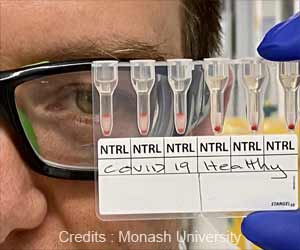.
Co-first author Dr. Alish Palmos from the Institute of Psychiatry, Psychology & Neuroscience (IoPPN) King’s College London said: “We have used a purely genetic approach to investigate a large number of blood proteins and established that a handful has causal links to the development of severe COVID-19. Honing in on this group of proteins is a vital first step in discovering potentially valuable targets for the development of new treatments”.
Protein levels can be measured directly from blood samples but conducting this type of research for large numbers of proteins is costly and cannot establish causal direction.
This is where the genetic method called Mendelian randomization that compares causal relations between risk factors and health outcomes, using large genetic datasets is used.
It can assess the relationship between genetic variants connected with an exposure (in this case high levels of individual blood proteins) and genetic variants connected with disease outcome (in this case severe COVID-19).
Causality between exposure and disease can be established because genetic variants inherited from parent to offspring are randomly assigned at conception similar to how a randomized controlled trial assigns people to groups.
In this study, the groups are defined by their genetic propensity to different blood protein levels, allowing an assessment of causal direction from high blood protein levels to COVID-19 severity whilst avoiding the influence of environmental effects.
The analysis identified that an enzyme (ABO) that determines blood group was causally associated with both an increased risk of hospitalization and a requirement for respiratory support.
This supports previous findings around the association of blood groups with a higher likelihood of death. Taken together with previous research showing that the proportion of group A is higher in COVID-19 positive individuals, this suggests blood group A is a candidate for follow-up studies.
Researchers also identified three adhesion molecules as being causally linked to a decreased risk of hospitalization and requirement of respiratory support.
As these adhesion molecules mediate the interaction between immune cells and blood vessels this chimes with previous research suggesting that late-stage COVID-19 is also a disease involving the linings of blood vessels.
These findings will need further clinical investigation which can be undertaken as part of the wider study that investigates the causes behind different aspects of COVID-19.
Source: Medindia



